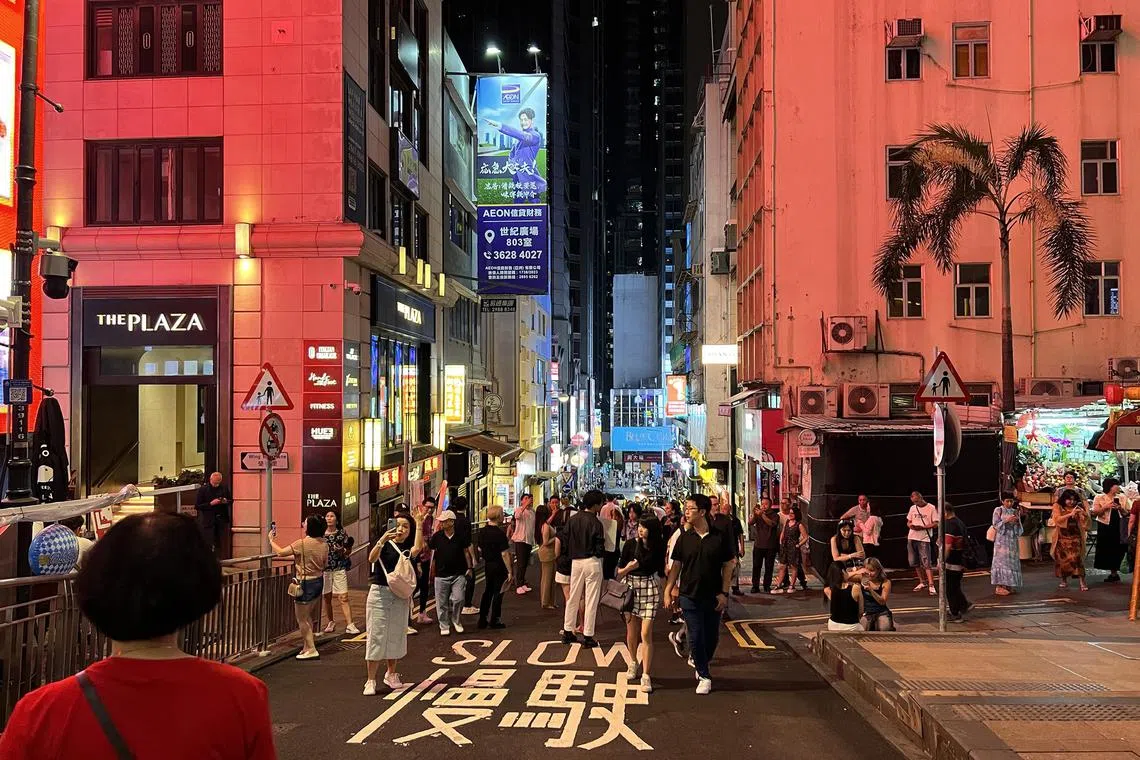Hong Kong’s expat nightlife hub Lan Kwai Fong reshaped by Chinese influx
Sign up now: Get ST's newsletters delivered to your inbox

The transformation that is taking place in Lan Kwai Fong, an area encompassing the eponymous sloping street and surrounding blocks in the Central business district.
PHOTO: ST FILE
Follow topic:
HONG KONG - For years, Mr Anthony Yiu had an English-only menu for his two small bars in Hong Kong’s nightlife hub Lan Kwai Fong, because most of his customers were expats, local professionals and foreign tourists. It was not until 2024 that he decided to add a Chinese version.
“In the past, Lan Kwai Fong was full of expats and locals who were upper-middle class and had strong spending power,” said Mr Yiu, 32, who has been struggling to make a profit for months from his bars, Shots and Chord. “A lot of them left Hong Kong over the past few years during the social unrest and Covid-19. And those were our target customers. Now, the visitors here are mainly from mainland China.”
Mr Yiu’s experience shows the transformation that is taking place in Lan Kwai Fong, an area encompassing the eponymous sloping street and surrounding blocks in the central business district.
Once synonymous with Hong Kong nightlife and in particular the city’s expat community, the area’s business mix is now changing to reflect what is becoming an increasingly Chinese city.
As Covid-19 ravaged nightlife economies around the world, Lan Kwai Fong was no exception, and many legacy establishments shut down.
Shopfronts that once saw revellers spilling out onto the streets even on weekdays are now quiet. Bars that drew crowds with Filipino cover bands and jello shots are giving way to Chinese restaurants.
“Bars and live music places for expats are struggling while Chongqing noodle shops are thriving,” said Mr Allan Zeman, whose Lan Kwai Fong Group owns several buildings in the district. “It’s a different demographic that we’re getting used to.”
In April, a restaurant called Chaotianmen Hot Pot opened for business in California Tower, once an area landmark.
In December, Chinese karaoke chain Mei KTV will open its first branch there in a 7,000 sq ft space, signalling another shift in the nightlife mix of Lan Kwai Fong.
Mr Zeman said he is also in talks with Chinese chain Luckin Coffee to open a branch in the area.
The increasingly Chinese-influenced retail makeup reflects the demographic shift in Hong Kong after years of political turmoil and pandemic restrictions.
Hong Kong’s population dropped by roughly 216,000, or about 2.8 per cent, from June 2020 to June 2022, according to census data.
To attract skilled workers, the Hong Kong government introduced the Top Talent Pass Scheme visa programme – about 95 per cent of the roughly 34,000 approved applicants were from mainland China in the first 10 months of the year, data shows.
Mainland travellers also remain the dominant source of the city’s visitors, accounting for 77 per cent of tourist arrivals in October.
Meanwhile, local residents, whose wealth has been dented by the worsening economy, are flocking across the border to cities like Shenzhen for cheaper options. That makes spending from mainland Chinese even more important to Hong Kong’s businesses.
More than half of Chaotianmen’s customers are mainland Chinese, including tourists and those who live in Hong Kong, said Ms Sarah Duan, manager of the restaurant.
Sales have been growing every month since the branch in Lan Kwai Fong opened, exceeding HK$1 million (S$173,000) in November, she said.
The group is now planning a second branch in the city’s tallest building, the International Commerce Centre, said Ms Duan.
While the rich may still be spending, the average Chinese tourist is much more frugal than before Covid-19.
China’s consumer confidence has been weakening amid a property market crash and economic slowdown, and visitors to Hong Kong who might have previously shopped at luxury stores now pursue cheaper social media driven activities.
Mr Yiu, who said he made on average of about HK$10,000 in alcohol sales for each of his bars on a weekday evening in 2018, now averages about HK$100.
Weekend income is about a fifth of what he saw in 2018. To cater to the changing spending habits of mainland Chinese, he is lowering the prices of some of his drinks and rolling out offers such as free shots with certain purchases.
Mr Yin Wong, who runs nightclub ROSE in Lan Kwai Fong, is also introducing cheaper drinks and cutting prices of existing products to appeal to Chinese customers. He has also opened accounts on Chinese social media networks including the Instagram-like app Xiaohongshu, WeChat and Douyin.
“Nowadays you work 10 to 20 times harder than before,” said Mr Wong, “but the return is just half of what you used to get.” BLOOMBERG

